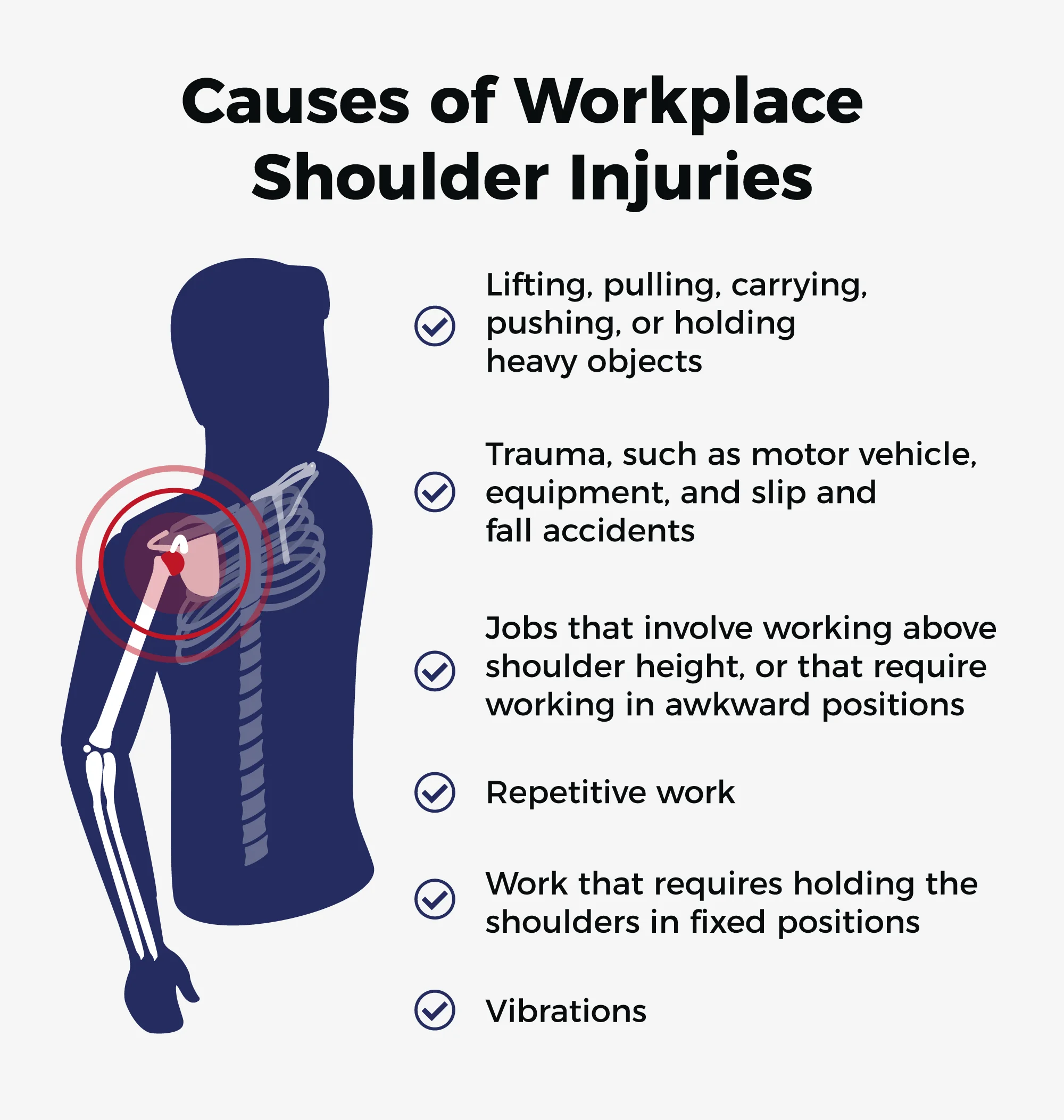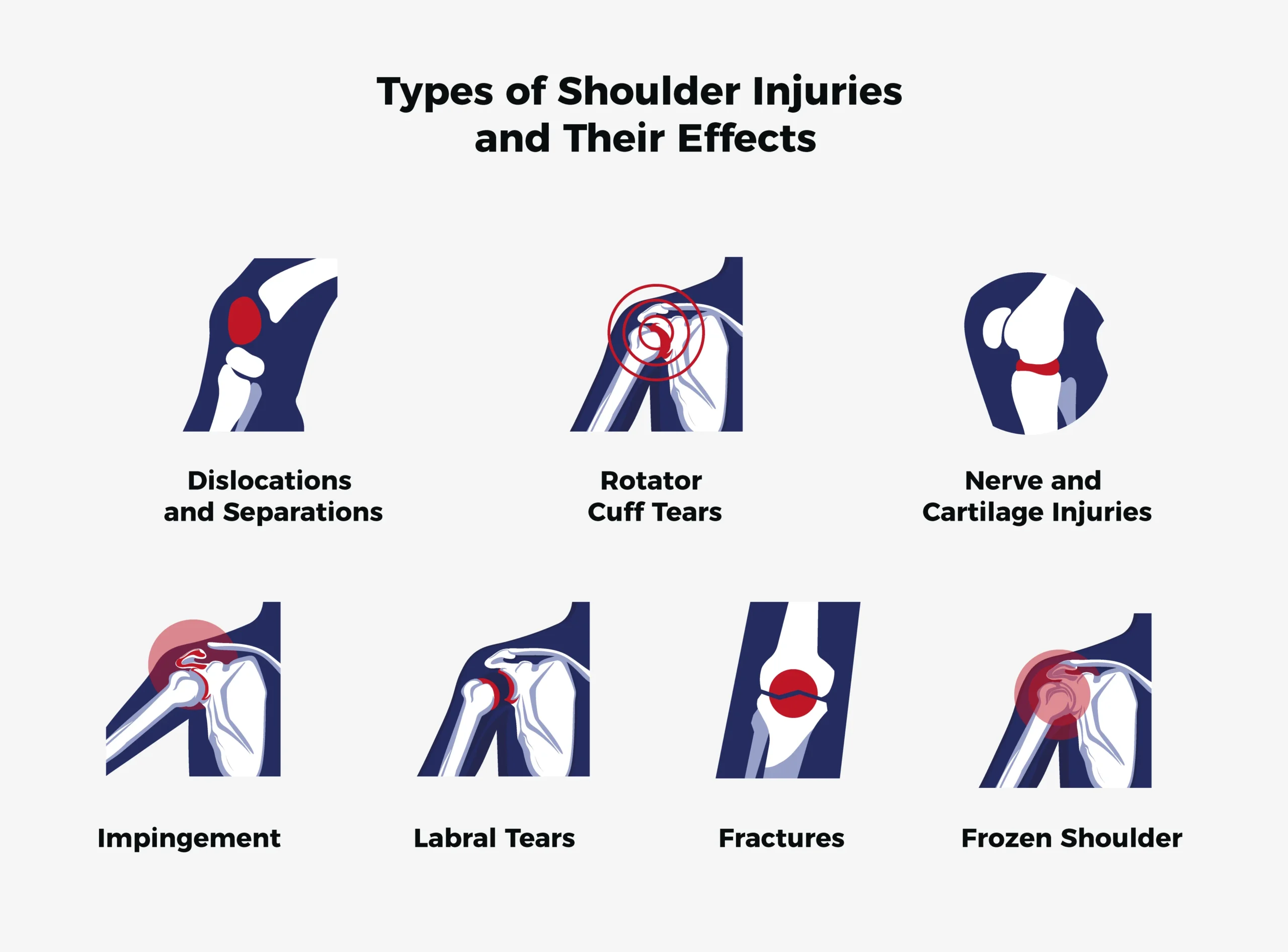Workers' Compensation Settlement for Shoulder Injuries
Your shoulder joint consists mainly of three major bones: The shoulder blade (“scapula”), collarbone (“clavicle”), and upper arm bone (“humerus”).
Your shoulder joint is critical to many of the things you do every day, including work activities. We often take for granted just how much we depend on our shoulders, but if you injure either or both of them at work, you can quickly come to appreciate their importance to you.
A shoulder injury you receive on the job can have a serious impact on your ability to work:
- The Occupational Safety and Health Administration of the US Department of Labor estimates that more than 65,000 shoulder injuries happen on the job every year, and that two-thirds of these injuries cause about three weeks of lost work time per injured employee.
- On average, a work-related shoulder injury can cause you to miss from 22 to 26 work days – at least a month of employment.
If you live in Arizona and have hurt your shoulder at work and at least temporarily cannot return to your job, or if you must seek medical treatment for your shoulder injury, then you may have a case for Arizona workers’ compensation benefits.
At the Matt Fendon Law Group, we have workers’ compensation lawyers who are experts in assisting injured workers like you to receive the workers’ compensation they need to heal, return to work if possible, and minimize the financial impact of medical treatment costs for a shoulder injury. Call us at (800) 229-3880 to discuss your work shoulder injury and to learn more about how Arizona workers compensation benefits can help you.
What Is a Shoulder Injury?
Shoulder injuries are common in general and as work-related injuries. They usually manifest as sprains, strains, and tears.
- Sprains are usually the result of an accident, like a fall, that injures ligaments in the shoulder joint. They can also happen because of repetitive stress or from having to keep your shoulders locked in one position for prolonged periods.
- Strains come from muscle or tendon tears in the joint. Like strains, they can be the result of a trauma to the shoulder, or from overuse, holding one position too long, or repetitive motions.
- Tears of muscles, tendons, or ligaments can occur after an acute injury to the shoulder, like a dislocation.
Shoulder Injury Symptoms
Symptoms of a shoulder can include the following:
- Shoulder stiffness.
- A feeling like your shoulder is not firmly in its socket and might pop out of it.
- Difficulty moving your arm.
- A feeling of lack of strength in your shoulder.
- Pain in your shoulder, neck, or arm when working or at rest.
If you experience any of these symptoms after a workplace accident, then after you receive proper medical treatment we recommend you speak with an Arizona workers compensation injury attorney. You only have one year to start a workers’ compensation benefit claim after an on-the-job injury or you could forfeit your right to claim benefits.
One of our experienced workers comp lawyers at Matt Fendon Law can help you know how much time you have to file a claim and help you prepare and file it.
Causes of Workplace Shoulder Injuries
We can trace shoulder injuries to one of three basic causes: trauma to the shoulder joint, overtaxing the joint (for example, moving an arm beyond its normal range of motion or bearing too much weight on the shoulders), and overusing the joint through repetitive motions or holding your shoulders in fixed positions for long periods.
These basic causes can overlap. In a worst-case scenario, you could have a repetitive stress shoulder injury that has developed over years of work, then one day at work you dislocate your shoulder when you hold your arm out when falling at work. Worse, you land on your shoulder anyway, causing further damage from the trauma when you hit the floor.
Shoulder injuries can happen from a sudden, single event, or they can be the result of a combination of factors over time. Similarly, if you incur a shoulder injury at work, you might notice the symptoms right away, or those symptoms may be delayed by anywhere from days to years.
Doctors and workers’ compensation insurance companies have more precise ways to describe how shoulder injuries happen at work. Here are some of these specific sources of workplace shoulder injury:
- Lifting, pulling, carrying, pushing, or holding heavy objects.
- Trauma. Employment-related motor vehicle or equipment accidents and slip and fall accidents are examples.
- Jobs that involve working above shoulder height or that require working in awkward positions.
- Repetitive work.
- Work that requires holding the shoulders in fixed positions.
- Vibrations.
Any of these causes can lead to a shoulder injury by itself. In addition, two more considerations can increase your risk of a shoulder injury at work:
- Physical contributors. Women workers are considerably more susceptible to incurring shoulder injuries than men are. If you are subject to conditions like arthritis, advancing age, or being overweight, for example, these can also increase your risk.
- Combining factors. The more shoulder injury contributors you are subject to, the more likely it is that you will experience a shoulder injury. According to one study, for example, if you are subject to three or more of the factors above, then you are four times more likely than average to suffer from a shoulder injury of at least three months’ duration.

Types, Effects, and Treatment of Workplace Shoulder Injuries
Types of Shoulder Injuries and Their Effects
Now that we understand the ways that you can experience a shoulder injury, let’s examine the different kinds of shoulder injuries our attorneys see in our workers’ compensation clients.
Dislocations and Separations
A dislocation happens when your top arm bone pops out of the shoulder socket. Dislocation injuries can happen in combination with injuries to your rotator cuff, shoulder ligaments, or cartilage.
A separated shoulder happens when ligaments connecting your collarbone to the shoulder blade tear.
Rotator Cuff Tears
Your rotator cuff is a group of four muscles that connect your upper arm to your shoulder and allow you to rotate your arm and use it for lifting.
The vast majority of shoulder injuries––about 90 percent––involve a torn rotator cuff injury claim. If your work requires you to make constant use of your arms, like a warehouse worker or construction worker, then you are at greater risk of a rotator cuff injury.
A rotator cuff tear can be hard to detect by medical imagery like X-rays. If you have a rotator cuff injury, you might experience any or all of these symptoms:
- A popping or cracking feeling in your shoulder, that can be audible.
- Shoulder pain, including pain that wakes you up when you are sleeping.
- Trouble lifting your arm overhead.
- A feeling of weakness in the arm.
- Difficulty placing your hands behind your back.
Impingement
Shoulder impingement describes a condition in which the bones in your shoulder are rubbing against adjacent tendons. Although impingement is usually something associated with advancing age, a trauma to the shoulder like a slip and fall or a traffic accident can worsen the condition.
Treatment for impingement usually involves nonsurgical measures, including steroid shots and physical therapy.
Labral Tears
Your labrum is a rubbery material that helps to increase your shoulder stability, but it is susceptible to tearing injuries. Common among these injuries are what doctors call “SLAP” tears (SLAP standing for “Superior Labrum Anterior and Posterior”).
SLAP tears come in multiple forms, from Type I to Type V. They happen commonly among athletes and workers whose jobs require them to work above shoulder level.
A shoulder labrum tear will cause you to feel deep pain in your affected shoulder. You may also experience a painful clicking or catching feeling when you move your arm. These injuries can be treated with several weeks of physical therapy or, in some cases, through arthroscopic surgery.
Frozen Shoulder
A frozen shoulder describes a medical condition that often follows an acute shoulder injury or shoulder surgery. It used to be known medically as “adhesive capsulitis.”
A frozen shoulder condition is one that develops over a long period––months or even years––and plays out through stages.
- The first stage is a “freezing” period in which you will experience growing shoulder pain that reduces your range of arm motion. This can last from two to 10 months.
- The next stage is the “frozen” one and will also last for several months. You will still have stiffness in the shoulder, but the chronic pain will not be as bad as in the freezing stage.
- The “thawing” stage is the one in which you will notice some improvement in your range of motion over a period of several months to a year or more.
Treatments for frozen shoulder conditions vary from physical therapy and medications to shoulder manipulation arthroscopic surgery.
Fractures
Work-related falls, motor vehicle and equipment accidents, and other trauma can cause any of the many bones in your shoulder girdle to fracture.
Common shoulder-girdle fractures include:
- Mid-clavicle (collarbone) fractures
- Fractures of the distal clavicle
- Scapular (shoulder blade) body fractures
- Acromion fractures
- Glenoid neck fractures
- Intra-articular glenoid fractures
- Coracoid fractures
- Humeral (upper arm bone) fractures
Clavicle, humerus, and scapula fractures, in particular, can cause you to miss considerable time from work. Fractures of shoulder joint bones often will need surgery to fix.
Nerve and Cartilage Injuries
Shoulder nerve injuries, like brachial plexus injuries, involve damage to the network of nerves found in your shoulder.
Cartilage injuries are usually tears that come from a traumatic injury or by repetitive wear over time.

Treatment of Shoulder Injuries
Arizona workers’ compensation claims cover medically necessary treatments for work-related shoulder injuries. This includes costs of surgery, rehabilitation, and medications. If these minimum measures do not produce the desired results, then your doctor will consider more advanced treatment, including minimally invasive or even open surgery.
Shoulder injury surgeries that Arizona workers’ compensation will cover include:
- Arthroscopy
- Torn rotator cuff injury repair
- SLAP repair
- Bankart repair
- Acromioclavicular (AC) joint repair
- Shoulder replacement surgery (or partial replacement, known as a hemiarthroplasty)
- Reverse shoulder replacement surgery
- Biceps tendon surgery
- Shoulder fracture repair
Many times shoulder injuries will be so painful or otherwise disabling that you will be unable to work, including light duty work. During your recovery from a shoulder injury, under workers’ compensation you might be in temporary total disability (TTD) status. TTD will allow you to receive wage replacement benefits up to two-thirds of your average monthly wage before your injury.
Costs of Shoulder Injury Treatment
Because of the complexity of the shoulder joint and recovery times that can often last for months or years, treating a shoulder injury can be expensive as well as time-consuming. According to the US Bureau of Labor Statistics, even if surgery is not needed, it can still cost an average of $20,000 annually to treat a shoulder injury.
If something like rotator cuff surgery is needed, then depending on the complexity of the surgical procedure, surgery costs can run from $8,000 to $20,000 or more. In more serious cases, like shoulder replacement surgery, the cost of surgery can be $100,000 or more.
Fortunately, surgery costs are reasonably necessary treatment costs for Arizona workers’ compensation purposes, meaning that workers’ compensation should cover all these costs for you if your injury is work-related.
Arizona Workers Compensation Benefits for Shoulder Injuries
Under Arizona’s workers’ compensation law, workers’ compensation benefits for a shoulder injury are not automatic. You must apply for and qualify for them.
Accordingly, the first thing you must do to qualify for Arizona Workers Compensation is to notify your employer that you have been injured. While there is no specific required time limit for you to do this, you do need to notify your employer “as soon as possible.”
Another time limit you must keep in mind is that you have only one year from the date of your shoulder injury (or when you discovered the injury if symptoms did not manifest on the day of the injury) to begin your Arizona Workers’ Compensation claim or you will lose your right to make a claim.
Once you have notified your employer and its workers’ compensation insurance company of your injury, your efforts will shift to showing that your injury is connected with your work. This connection can be direct––like an accident at work that injured your shoulder––or indirect––such as a condition that your work environment has made worse to the point you are now experiencing a disability.
An Arizona workers’ compensation attorney, like one of our attorneys at the Matt Fendon Law Group, can help you to identify and secure the evidence you will need to prove a work connection to your shoulder injury workers comp claim.
Types of Workers Compensation Disability Benefits
Depending on how serious your shoulder injury is, you can receive one of multiple kinds of Arizona workers’ compensation. These break down into temporary and permanent benefits.
Temporary Disability Benefits
Temporary Partial Disability: If you have a work-related injury but can return to work to do some of your job duties, then temporary partial disability benefits might apply to you. A doctor must specify what restrictions prevent you from doing all of the work tasks you did before the injury. Temporary partial benefits are two-thirds of the difference between your pre-injury monthly wages and the earnings you are earning during your recovery.
Temporary Total Disability: You can receive temporary total disability (TTD) benefits if you cannot work during your injury recovery period. TTD benefits are equal to two-thirds of your average monthly wage before you were injured. TTD benefits are also capped at a maximum amount, which changes every year.
Permanent Disability Benefits
Permanent impairment injuries come in two general kinds: scheduled and unscheduled.
Scheduled Injuries
A scheduled injury is one that is identified under Arizona’s workers’ compensation statutes. Scheduled injuries include those to the arm. For example, a permanent partial loss of your dominant or “major” arm can entitle you to 60 months of compensation at 55 percent of your average monthly income, while the same injury to your non-dominant or minor arm can qualify for 50 months of benefits at the same rate.
Unscheduled Injuries
Unscheduled injuries are those that are not included in Arizona’s list of scheduled injuries. An unscheduled injury is the result of a general impairment, or multiple impairments to different body parts arising from the same cause, or a history of other permanent impairments.
Shoulder injuries are one form of unscheduled injury.
The Industrial Commission of Arizona (ICA) decides how much unscheduled permanent impairment compensation you are entitled to. This is based mainly on your loss of earning capacity.
Additional factors the ICA considers are your age, education, and work experience. The amount of income you will be able to earn in the future is also considered.
A permanent total disability can qualify you to receive workers’ compensation benefits for the rest of your life.
Permanent unscheduled partial disability benefits are different from total disabilities in that they usually involve the trunk of your body (for example, your head, back, shoulders, and hips). This kind of permanent partial disability can also result from having multiple scheduled impairments and from mental health conditions.
To qualify for permanent unscheduled partial disability benefits, you must show that because of your injury-related work restrictions, you earn less income than you made before you were injured. Permanent partial disability benefits are also available if you are unable to return to work or find an appropriate job.
Settling Your Arizona Workers Compensation Shoulder Injury Claim
As your recovery progresses, you will eventually get to a point where you will not get any better even with continued medical treatment. This is the point when you have reached maximum medical improvement (MMI). After this, your treating doctor will rate you for a permanent disability, if applicable, according to guidelines set by the American Medical Association.
Once you have reached your MMI, it will be time to consider settlement of the remainder of your Arizona Workers’ Compensation claim. This will involve negotiating with your employer’s workers comp insurance company.
Arizona law allows you to reach a full and final settlement for your workers’ comp claims in a lump-sum payment. For a shoulder injury case this has its advantages and disadvantages. What you need to know about when negotiating a full and final workers’ compensation shoulder injury settlement is all of the factors that go into establishing the full and fair value of your claims.
Here are some shoulder injury claims factors our attorneys have seen included in an average workers comp settlement negotiations:
- Does the employer or its insurer dispute whether your shoulder injury is work-related?
- How severe are your injuries? More serious injuries, like torn rotator cuff injuries, are also known as “hard injuries” as compared to soft tissue injuries and are generally worth more in settlement.
- Soft tissue injuries, by contrast, tend to be easier to dismiss as minor or something that will get better quickly. To convince an insurance adjuster that your sprain or strain has real value, you’ll need to work harder to describe the mechanism and severity of your injury.
- When can you go back to work? Can you return to work at all?
- Will your employer require you to resign as part of your settlement?
- What was your true average monthly wage before the shoulder injury? What are your lost wages because of the injury?
- Do you expect any future lost wages?
- How does your age affect the value of your settlement?
- Where do you live? If you live in a rural area, for example, if you live in a rural area it may be more difficult for you to find new employment, and this can increase your settlement value potential.
- What kind of work were you doing? If you were a manual laborer, for example, your settlement value can be higher because it will be harder for you to do manual labor after experiencing a shoulder injury.
- What is your prior medical history? Have you had any prior shoulder injuries? If so, the workers’ comp insurer may try to use this history to reduce the settlement it offers you.
- How much have you already been paid in workers’ compensation benefits?
- What are your expected future medical bills? For example, will you need surgical treatment for your shoulder injury? Your settlement negotiation needs to account for the prospect of all your future medical expenses because you cannot reopen a full and final settlement if your future medical treatment cost estimates are too low.
- Do you suffer from any other physical injuries or psychological consequences besides your shoulder injury? If these develop over time they might be compensable consequences of the shoulder injury and should be included in your full and final settlement.
- Do you have any other sources of income? Are you receiving Social Security Disability Income or Social Security retirement income? These can affect the calculation of your overall settlement amount.
- Do you have other sources of medical benefits or payment for other medical costs, like a separate government or private healthcare insurer?
Full and final settlement negotiations for Arizona workers’ compensation cases can be time consuming and can even be frustrating. But it is essential that you and your workers compensation attorney carefully and thoroughly uncover all the kinds of settlement compensation you are entitled to, because the workers compensation insurer and its attorneys have no obligation to you to see that you receive the maximum settlement value.
Having an experienced Arizona workers comp attorney, like one of our lawyers at Matt Fendon Law, to negotiate on your behalf will ensure that you do not leave any benefits on the table in your lump sum workers comp shoulder injury settlement.
Talk with an Arizona Workers Compensation Lawyer Today
At the Matt Fendon Law Group, our highly skilled and compassionate workers compensation lawyers are ready to help you with all aspects of work-related accidents, workers compensation shoulder injury cases, and workers comp settlements.
If you have had a work-related accident, we can help you to understand the Arizona workers’ compensation process and to negotiate with your employer’s insurance company. If the ICA denies any part of your claim, we can also represent you on appeal. And, in cases where your employer does not participate in workers’ compensation, we can help you to explore other ways to receive compensation for your shoulder injury, including a negligence lawsuit against the employer if necessary.
Call us today at (800) 229-3880 to schedule a confidential, free consultation with an experienced workers’ compensation lawyer in Phoenix. Or, if you prefer, you can contact us online to ask a question or to schedule a free consultation about your workers’ compensation case.
We have offices in Phoenix, Prescott, Flagstaff, Scottsdale, and Tucson. Let us show you how we can help you with your Arizona workers’ comp case. We will provide straightforward advice about your workers’ comp benefits and help you understand your legal options.



















